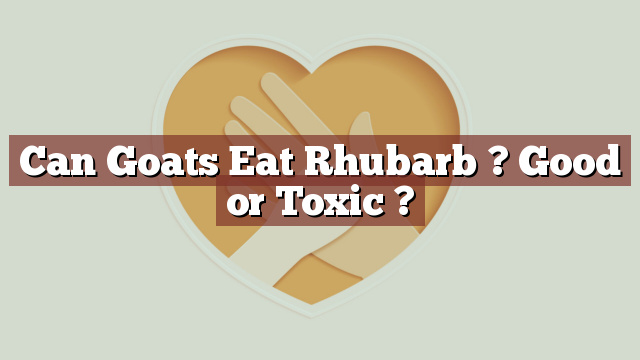Can Goats Eat Rhubarb? Good or Toxic?
It is important for goat owners to be aware of what foods are safe for their animals to consume. While goats are known for their ability to eat a wide variety of plants, there are certain foods that can be harmful to their health. One such food that raises questions is rhubarb. So, can goats eat rhubarb? Let’s dive into the nutritional value of rhubarb for goats and find out if it is safe or toxic for them.
Nutritional Value of Rhubarb for Goats
Rhubarb is a vegetable that is often used in cooking and baking due to its tart flavor. It is low in calories and contains a good amount of dietary fiber, vitamin C, calcium, and potassium. These nutrients are beneficial for humans, but what about goats?
Can Goats Eat Rhubarb? Is it Safe or Toxic?
No, goats should not eat rhubarb. While rhubarb may have some nutritional value for humans, it can be toxic to goats. Rhubarb leaves contain a high concentration of oxalic acid, which is harmful to many animals, including goats. Ingesting large amounts of this acid can lead to kidney damage and even death in goats.
Potential Risks and Benefits of Feeding Rhubarb to Goats
Feeding rhubarb to goats can have severe consequences. As mentioned earlier, the oxalic acid found in rhubarb leaves can be toxic and cause serious health issues. Goats that consume rhubarb may experience symptoms such as drooling, diarrhea, difficulty breathing, and abdominal pain. In severe cases, it can lead to kidney failure and be fatal.
On the other hand, some may argue that rhubarb stalks, which contain a lower amount of oxalic acid, could be fed to goats in small quantities. However, it is essential to understand that even the stalks may still contain harmful levels of the acid. Therefore, it is best to err on the side of caution and avoid feeding rhubarb to goats altogether.
What to Do If Your Goat Eats Rhubarb
If by any chance your goat consumes rhubarb, it is crucial to take immediate action. Contact your veterinarian right away and provide them with all the necessary information. They will guide you through the necessary steps or treatments to help your goat recover from this potential poisoning. Remember, time is of the essence in such situations, so do not delay seeking professional help.
Conclusion: Rhubarb Should be Avoided in Goats’ Diet
In conclusion, rhubarb should be strictly avoided in goats’ diet. While it may offer some nutritional benefits for humans, it contains oxalic acid that can be toxic to goats. The potential risks of feeding rhubarb to goats far outweigh any potential benefits. As responsible goat owners, it is crucial to prioritize the health and well-being of our animals by providing them with a diet that is safe and suitable for their needs.
Thank you for investing your time in exploring [page_title] on Can-Eat.org. Our goal is to provide readers like you with thorough and reliable information about various dietary topics. Each article, including [page_title], stems from diligent research and a passion for understanding the nuances of our food choices. We believe that knowledge is a vital step towards making informed and healthy decisions. However, while "[page_title]" sheds light on its specific topic, it's crucial to remember that everyone's body reacts differently to foods and dietary changes. What might be beneficial for one person could have different effects on another. Before you consider integrating suggestions or insights from "[page_title]" into your diet, it's always wise to consult with a nutritionist or healthcare professional. Their specialized knowledge ensures that you're making choices best suited to your individual health needs. As you navigate [page_title], be mindful of potential allergies, intolerances, or unique dietary requirements you may have. No singular article can capture the vast diversity of human health, and individualized guidance is invaluable. The content provided in [page_title] serves as a general guide. It is not, by any means, a substitute for personalized medical or nutritional advice. Your health should always be the top priority, and professional guidance is the best path forward. In your journey towards a balanced and nutritious lifestyle, we hope that [page_title] serves as a helpful stepping stone. Remember, informed decisions lead to healthier outcomes. Thank you for trusting Can-Eat.org. Continue exploring, learning, and prioritizing your health. Cheers to a well-informed and healthier future!

